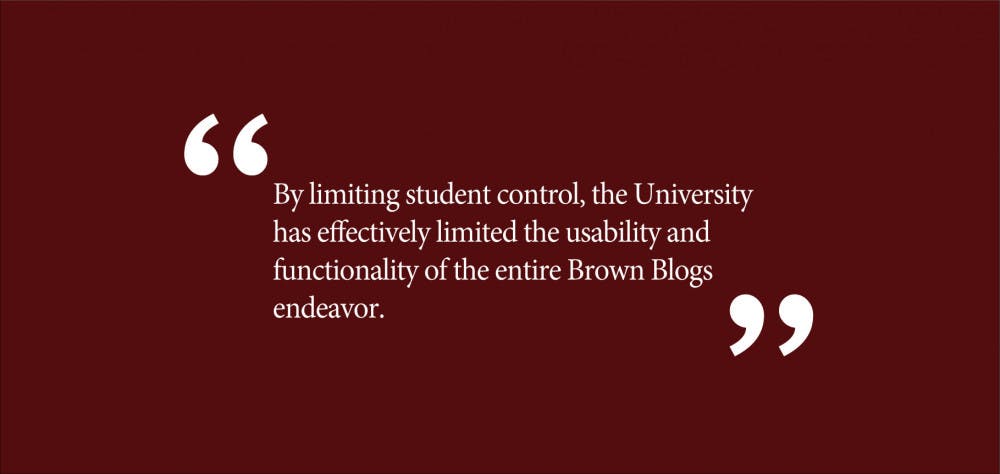The University provides students with a number of digital tools to supplement their academic work. But these tools are only useful if they are effectively implemented. For instance, the technological limitations of Brown Blogs, which allows students to publish their own digital journals, has prevented it from becoming a helpful resource for community members.
Brown Blogs is a Wordpress platform managed by the University that provides an outlet for students or groups on campus. Each student can create one personal blog, which is then hosted by a University Wordpress service. But the University does more than provide and host this platform: it also mandates how much control students are allowed to have over their blog — including how users are displayed and added, and what additional features can be installed. By limiting student control, the University has effectively limited the usability and functionality of the entire Brown Blogs endeavor.
For example, the display names of writers auto-populate from the University’s records and cannot be changed directly on the Brown Blogs interface. This means that the names of blog authors and administrators have to match the names used within Brown systems. This effectively prevents writing under pen names — a useful tool for those who are trying to separate personal and professional profiles. But this is even more problematic for people whose legal names do not match their chosen names. For some, this might be a minor inconvenience. For example, I write under the name “E.L.”, but am registered with Brown under my true legal name. But for others, particularly transgender individuals who have not yet legally changed their names, the ramifications are much more significant. Brown Blogs effectively facilitates deadnaming.
While Brown Blogs does offer a workaround, it is not a scalable solution. When I created an author account with Brown Blogs, I was automatically added with my full legal name and could not modify my account name or display name. The Web Services team helped me by manually updating the database. This is a fine enough work around for one author, but it should be possible to credit work to multiple authors who have different chosen names than their legal ones. Requiring students to individually work with Web Services would not be sustainable. I also would not want to invite authors to a blog only to deadname them with the account creation process — this wouldn’t reflect well on me as a blog manager, but mostly it would be just cruel to potential authors.
Brown Blogs’ lack of flexibility goes beyond display names: only certain add-ons are supported on the site, presumably a conscious choice of the Brown Blogs administration team. But some Wordpress widgets and plug-ins that are not supported by Brown Blogs provide additional utility that is necessary for certain projects. In the blogging project I am working on, I wanted to provide contributing authors with their own author pages that would collect links to any posts they have written and also provide a centralized location for their bios. There are Wordpress plug-ins that easily do this, but they are not supported by the Brown Blogs platform. Without the ability to add such plug-ins, some of the central functionality of the blog project would be lost.
There are other issues that plague the Brown Blogs platform. Individual blogs are only available as long as the blog owner is a student, so upon graduation the blog will disappear. This means that students who create individual blogs are responsible for the preservation of their own work. While there is an option to download one’s blog and re-upload it onto another platform, this relies on students knowing that they need to take this step to preserve their work. Additionally, this requirement diminishes one of the functions of providing a platform in the first place.
Brown Blogs could be a powerful and useful tool for students. Providing us with easy access to an online publishing platform can encourage public scholarship and writing and editing practice — all crucial components of a modern education. The hosting and tech support provided by the University can make these activities easier for students, and certainly the platform’s association with the name “Brown” can give credibility to its users.
But this association with the University comes at a cost. The University should continue to offer Brown Blogs as a service, but only if it makes changes to give students more flexibility. With the ability to access our own display names and add-ons, Brown Blogs can be a powerful digital tool for students.
E.L. Meszaros GS can be reached at e.l.meszaros@brown.edu. Please send responses to this opinion to
letters@browndailyherald.com and op-eds to opinions@browndailyherald.com.



